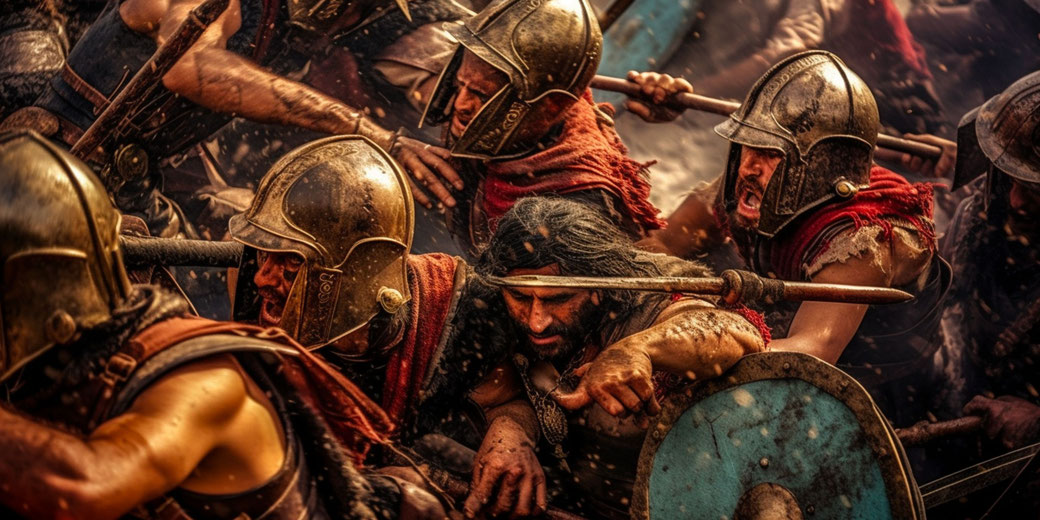The Messenian Wars: How Sparta conquered and enslaved its neighbours

The Messenian Wars were a series of conflicts between the ancient Greek city-states of Sparta and Messenia which dramatically transformed the sociopolitical landscape of the Peloponnesian Peninsula.
For Sparta, the wars led to the consolidation of its military power and the establishment of its unique social structure, including the helot system—a form of slavery that would both strengthen and challenge the Spartan state for centuries.
Sadly for Messenia, the wars resulted in subjugation and the loss of independence, turning its people into slaves who would labor under Spartan rule but also resist it in various forms.
Why did Sparta and Messenia go to war?
The Peloponnesian Peninsula, a rugged landscape of mountains, fertile plains, and coastal areas, was home to various city-states, each with its own distinct culture, governance, and ambitions.
Among these were Sparta and Messenia, neighbors whose proximity would prove to be both a blessing and a curse.
Sparta, located in the region of Laconia, was a militaristic society that placed a premium on discipline, courage, and martial prowess.
Messenia, on the other hand, was a fertile region rich in resources but less militarized than its Spartan neighbor.
Its society was more agrarian, and its governance less centralized, making it both prosperous and, from a Spartan perspective, ripe for conquest.
Sparta's growing population and limited arable land made the fertile plains of Messenia an attractive target.
Additionally, the Spartans believed in their divine right to conquer, often citing oracles and prophecies as justification for expansion.
The First Messenian War
The First Messenian War, traditionally dated from around 743 to 724 BC, marked the beginning of a long and tumultuous relationship between Sparta and Messenia.
The war commenced with the Siege of Ampheia, a Messenian city near the border between the two city-states, whose fall provided Sparta with a foothold in Messenian territory.
From there, the conflict escalated into a full-blown invasion, with Spartan hoplites, organized in their formidable phalanx formation, clashing with Messenian forces who were less well-equipped and less well-trained but fiercely determined to defend their homeland.
The Spartans employed a combination of military strategy and psychological warfare to subdue the Messenians.
They were also said to have received divine sanction from the Delphic Oracle, which bolstered their resolve and gave them a sense of moral superiority.
Despite facing a more powerful enemy, the Messenians, under King Euphaes and then King Aristodemus, put up a valiant fight, utilizing the rugged terrain to their advantage and engaging in guerrilla tactics.
However, the superior military organization and discipline of the Spartans gradually wore down Messenian resistance.
After nearly two decades of fighting, the Messenians were finally subdued. The consequences were severe: much of the Messenian population was reduced to the status of helots, bound to the land they once owned and forced to give half of their produce to their Spartan overlords.
This new influx of helots provided Sparta with the economic base to sustain its militaristic lifestyle, allowing male citizens to focus on military training rather than agriculture.
The Second Messenian War
The Second Messenian War, which erupted around 685 BC and lasted until approximately 668 BC, was in many ways a continuation of the unresolved tensions and grievances that had simmered since the end of the first conflict.
By this time, the Messenians had lived under Spartan rule for several generations, but the yoke of servitude sat heavily upon them.
The helot system, which had been imposed following the First Messenian War, was a constant source of tension, and the Messenians yearned for the restoration of their independence.
This desire for freedom found its most potent expression in the figure of Aristomenes, a Messenian hero whose deeds would become the stuff of legend.

Aristomenes led a revolt that initially caught the Spartans off guard. The Messenians, learning from past experiences, had improved their military organization and tactics.
They also took advantage of the natural fortifications provided by Mount Ithome, which became a stronghold for the Messenian resistance.
Aristomenes himself was said to have performed acts of incredible valor, including infiltrating Spartan territory to carry out daring raids.
His exploits became so renowned that he was considered invincible, a belief that boosted the morale of the Messenian fighters.
However, the Spartans regrouped and adapted their strategies, focusing on a long-term siege of Mount Ithome and other key strongholds.
They also sought divine guidance, consulting the Delphic Oracle for advice on how to proceed.
The war became a grueling, drawn-out affair, with both sides suffering heavy losses.
Eventually, the superior resources and military machinery of Sparta began to tip the balance. The disciplined phalanx formation also proved decisive in breaking the morale and resistance of the Messenians.
Despite the Messenians' valiant efforts and the near-mythical heroism of Aristomenes, they could not sustain the fight indefinitely.
The Third Messenian War
The Third Messenian War, also known as the 'Great Helot Revolt', is sometimes not considered a Messenian War in the traditional sense, but it nonetheless had significant implications for both Sparta and Messenia.
Occurring around 464 BC, this conflict was sparked by a massive earthquake that struck Sparta, causing widespread death, destruction and chaos.
Seizing the opportunity, the helots, many of whom were of Messenian descent, staged a large-scale revolt against their Spartan overlords. Historians suggest tens of thousands of helots participated in the rebellion.
This uprising was different from previous conflicts; it was not a war between two independent states but a revolt of an oppressed class within a state.
However, the spirit of Messenian resistance was very much alive in this struggle, echoing the heroics of figures like Aristomenes from the past.

The Spartans, already dealing with the aftermath of the earthquake, found themselves in a precarious situation.
The helot revolt was a serious threat, not just to Spartan control over Messenia but to the very fabric of Spartan society, which relied on helot labor to sustain its militaristic lifestyle.
In a rare move, Sparta appealed for assistance from other Greek city-states. While some, like Athens, initially sent aid, they quickly withdrew their support upon realizing the extent of the helot problem and the potential implications for their own societies.
The war was brutal and marked by guerrilla tactics, sieges, and pitched battles.
The helots and their allies fortified themselves in strongholds like Mount Ithome, reminiscent of earlier Messenian resistance.
The Spartans, for their part, were as ruthless as ever in quelling the revolt, employing their well-honed military strategies and brutal suppression techniques.
After several years of fighting, the Spartans managed to put down the revolt, but not without significant cost.

The Third Messenian War had lasting consequences for both Sparta and Messenia.
For Sparta, it exposed the vulnerabilities and contradictions of a society built on the oppression of a large underclass.
The helot issue remained a thorn in the side of the Spartan state, necessitating constant vigilance and periodic brutalities targeting helot leaders to keep them in check.
For Messenia, the revolt was another chapter in its long history of resistance against Spartan domination.
While it did not result in Messenian independence, it kept alive the embers of resistance, which would continue to flare up in subsequent generations, challenging the Spartan hegemony and shaping the broader currents of Greek history.
What do you need help with?
Download ready-to-use digital learning resources
Copyright © History Skills 2014-2025.
Contact via email
With the exception of links to external sites, some historical sources and extracts from specific publications, all content on this website is copyrighted by History Skills. This content may not be copied, republished or redistributed without written permission from the website creator. Please use the Contact page to obtain relevant permission.





